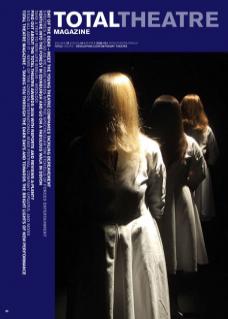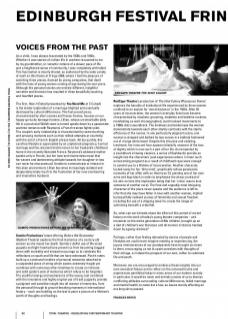As a child, I was always fascinated by the 1930s and 1940s. Whether it was stories of civilian life in wartime recounted to me by my grandmother, or romantic notions of a slower pace of life and a heightened sense of community, I was completely enthralled. This fascination is clearly shared, as evidenced by the wide variety of work on this theme at Fringe 2008, where I had the pleasure of watching three pieces, devised by young companies, that dealt with the lives of young women coming of age during the war years. Although the personal stories are entirely different, insightful narrative and direction has resulted in three beautifully touching and heartfelt pieces.
The first, How It Ended (presented by You Need Me at C Cubed) is the tender exploration of a marriage blighted and eventually destroyed by cultural differences. This fast-paced piece, characterised by short scenes and freeze-frames, focuses on our happy-go-lucky teenage heroine, Lillian, whose unremarkable daily life in a provincial Welsh town is turned upside down by a passionate wartime romance with Raymond, a French trainee fighter pilot. The couple’s early relationship is characterised by some touching and amusing moments such as their stilted attempts at courtship with the aid of a French-English phrase book. All too quickly, this carefree lifestyle is superseded by an unplanned pregnancy, hurried marriage and the reluctant bride’s return to her husband’s childhood home in the recently liberated France. Raymond’s widowed mother speaks only in French, but her tone and mannerisms mean that her severe and domineering attitude towards her daughter-in-law can never be misconstrued. Unable to communicate or interact in this alien environment, Lillian becomes increasingly isolated and desperately lonely much to the frustration of her now overbearing and insensitive husband.
Gomito Productions’ latest offering Before We Remember (Bedlam Theatre) explores the final memories of a century-old woman as she meets her death. Gomito's skilful use of life-sized puppets and light-hearted tone prevent us from becoming bogged down with morbidity and instead encourage us to celebrate the reflections on youth and life that we have witnessed. Post-it notes build up a communal timeline of personal memories attached to a suspended piece of string which seems extremely fragile yet combines with numerous other timelines to create an intricate and solid spider’s web of memories which refuse to be forgotten. The youthful energy and exuberance of the young cast combined with the innovative and highly original use of trash puppetry provide a poignant and sensitive insight into all manner of memories, from the personal through to ground-breaking moments in international history – each one building on the last to paint a picture of a lifetime’s worth of thoughts and feelings.
RedCape Theatre’s production of The Idiot Colony (Pleasance Dome) explores the banality of institutional life experienced by three women confined to an asylum for ‘moral deviance’ in the 1940s. After 40 years of incarceration, the women’s everyday lives have become characterised by ritualistic grooming, mealtime and bedtime routines, manifesting as well-choreographed, synchronised movements to a 1980s disco soundtrack. The kindness and tenderness the women demonstrate towards each other starkly contrasts with the sterile efficiency of the nurses. In one particularly poignant scene, one woman is stripped and bathed by two nurses in a bathtub fashioned out of a large white towel. Despite this intrusive and violating treatment, her innocent face appears blissfully unaware of the loss of dignity which is now such a part of her life. Accompanied by a soundtrack of swing classics, a series of flashbacks provide an insight into the characters’ past experiences where ‘crimes’ such as becoming pregnant as a result of childhood rape were enough to commit you to a lifetime of incarceration. Another character, locked away for her ‘dirty mind’, graphically relives passionate moments of her affair with an American GI, painting one of her own arms and legs black in order to emphasise the sharp contrast of his skin on hers (the implication being that her ‘crime’ was to love someone of another race). The final and arguably most intriguing character of the piece never speaks and the audience is left to infer that she may have fallen in love with another woman, implied by beautifully realised scenes of femininity and sexual freedom including the use of a dripping towel to create the image of swimming beneath a waterfall.
So, what can we intimate about the effect of this period of recent history on the work of today’s young theatre companies – and moreover on the entire generation of 80s children, brought up on a diet of children’s war literature and all manner of stories handed down by ageing relatives?
Perhaps, rather than feeling alienated by stories of people and lifestyles we could never imagine meeting or experiencing, the joyous reminiscences of our grandparents have brought us closer to them, encouraging us not to upset ourselves with thoughts of their old age, or indeed the prospect of our own, rather to celebrate life and youth.
Moreover, we are encouraged to embrace these insights into our own ancestral history and to reflect on the universal truths and experiences paralleled today in many areas of our modern society. In particular, it would be naive and entirely unwise of us to dismiss conflicting attitudes surrounding cultural differences, failed marriage and mental health, to name but a few, as issues merely affecting an era long since passed.

